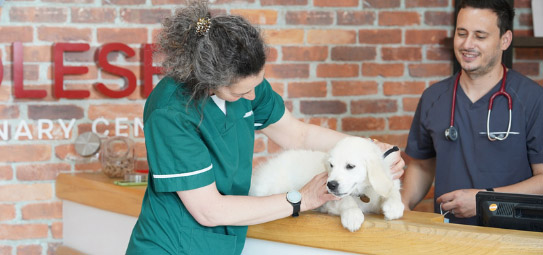
Vet Darren Partridge shares how to prepare your exotic pet bird for winter
September 21, 2022
Winter in Surrey can be beautiful, but if you’re not a fan of the cold, it can be a harsh season – especially for pet birds.
Most pet parrots, lovebirds, budgies, and other species of exotic birds kept in the UK originate from much warmer continents like South America and Africa. As their biology is finely tuned into warm climates, they will not fair-well in British winters unless the appropriate care and measures are taken.
“But it’s not even autumn yet”, we bet you’re thinking… With winter edging closer every day, Exotics Vet Darren Partridge has written this advice to help you prepare in advance of a cold snap and keep your pet bird in top shape.
If you have any concerns, book an Exotics health check with Darren at our East Molesey surgery by calling 0208 979 1384, or
UK winter advice for pet parrots & other exotics birds
Darren encourages all UK pet bird owners to make the following adjustments as it starts to get chilly.
1. Prepare a suitable indoor space
You will need to move your pet bird indoors as temperatures start to drop (or their aviary needs to remain at around 20 degrees Celsius – depending on species). Avoid anywhere near fires or heaters that produce smoke and fumes as these can cause respiratory problems. Make sure their new indoor home doesn’t get chilly by blocking off drafts and popping on the central heating. Keep an eye on humidity levels to avoid issues with their mucus membranes drying out and provide good airflow and ventilation for optimal health.
2. Add extra warmth
Consider covering your pet bird’s cage overnight with a sheet or blanket to keep them warm. Avoid using ‘bird tents’, ‘snuggle sacks’ and ‘cosy corners’ that go inside the cage as their soft fabric and nest-like feel can encourage seasonal mating routines. This can make pet birds become hormonally aggressive.
3. Extend their indoor ‘daylight’ hours
Keep lights on during the evening and reduce long periods of darkness to avoid your bird getting stressed. In case of power cuts, keep battery-powered lighting to hand – birds and hot uncovered lightbulbs do not mix well!
4. Make extra food available
Stocking up on caged and aviary bird food is a good idea as exotic birds may eat more than usual during colder months. Ensuring they have a healthy, balanced diet will help them put on a bit of weight to help stay warm, as well as boost their immune system to fight off any winter illnesses.
5. Provide warm water treats
Filling your pet parrot, lovebird, or budgie’s water bowl with lukewarm water can be a nice winter treat for them to enjoy and rehydrate with. A shallow, lukewarm bath to splash about in is nice too, but be sure they are able to dry off after to avoid becoming unwell. Pet parrots don’t get colds as such, but they are prone to respiratory illnesses.
Signs your pet bird is unwell:
- Breathing difficulties
- Sneezing
- Coughing
- Nasal discharge
- Appetite loss
- Lethargy
- Fluffed up feathers
- Excess urination
6. Monitor your bird’s behaviour
Darren recommends keeping an eye on your pet bird to spot any signs of illness, as well as how they are doing with the temperature inside your home. Spotting signs early can help you make prompt adjustments and avoid your pet becoming unwell.
Signs your pet bird is too cold:
Increased appetite
Fluffing up feathers and burying its beak into the chest
Squatting to cover its legs in feathers and shivering
Lethargic and loss of appetite in extreme cases
Signs your pet bird is too hot:
Open beaked breathing
Holding their wings away from the body
Unbalanced movements and seizures in extreme cases.
Contact Molesey Vets on 0208 979 1384 for advice if your exotic pet bird is struggling with the cold or heat.



